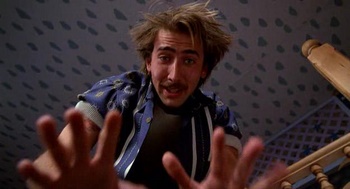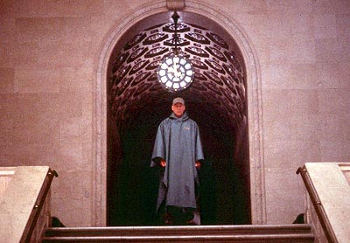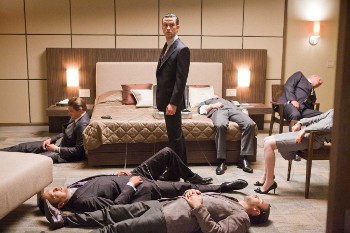Twitter Review: Stay
2005’s ‘Stay’ is too aggressively off, fostering sensitivity to its head game rather than engagement in the story. Gosling holds it together
2005’s ‘Stay’ is too aggressively off, fostering sensitivity to its head game rather than engagement in the story. Gosling holds it together
Aussie crime thriller ‘The Square’ is poised to explore guilt in a handful of characters but instead becomes a ridiculous, contrived tragedy
Against its Swede forebear, ‘Let Me In’ accumulates minor changes that make it too insistent. Fidelity is a pleasant surprise but not enough
 For whatever reason, I’ve steadfastly avoided most of the Coen brothers’ sillier movies. But a friend’s earnest e-mail (titled “Urgent Coen Brothers symbolism inquiry”) pushed me to watch Raising Arizona, which in the context of a discussion of nihilism and No Country for Old Men led me back to Miller’s Crossing, which for the hell of it got me (for the first time) to see The Big Lebowski. (Understand that I do not put Miller’s Crossing among “the Coen brothers’ sillier movies.”) Watching the three together was instructive.
For whatever reason, I’ve steadfastly avoided most of the Coen brothers’ sillier movies. But a friend’s earnest e-mail (titled “Urgent Coen Brothers symbolism inquiry”) pushed me to watch Raising Arizona, which in the context of a discussion of nihilism and No Country for Old Men led me back to Miller’s Crossing, which for the hell of it got me (for the first time) to see The Big Lebowski. (Understand that I do not put Miller’s Crossing among “the Coen brothers’ sillier movies.”) Watching the three together was instructive.
 Atom Egoyan has been on some kind of losing streak. Since his breakthrough masterpiece The Sweet Hereafter in 1997, his fiction features have gone from dense and compelling if awkward psychological dramas. With the caveats that it’s a remake and not written by Egoyan, Chloe seems to chart a new path for the filmmaker, even though it collapses in a fit of silliness just as it threatens to become probingly nasty.
Atom Egoyan has been on some kind of losing streak. Since his breakthrough masterpiece The Sweet Hereafter in 1997, his fiction features have gone from dense and compelling if awkward psychological dramas. With the caveats that it’s a remake and not written by Egoyan, Chloe seems to chart a new path for the filmmaker, even though it collapses in a fit of silliness just as it threatens to become probingly nasty.
 Sadly, M. Night Shyamalan’s Unbreakable hasn’t held up well, suffering from an inability to transcend its conceit.
Sadly, M. Night Shyamalan’s Unbreakable hasn’t held up well, suffering from an inability to transcend its conceit.
Dizzyingly fragmented, Welles’ ‘F for Fake’ builds layers of credible story exploring authenticity. ‘This is true, you know.’ No, you don’t.
 In my hastily keyboarded notes after seeing Inception last weekend, I spent much time faulting Jim Emerson for his dismissal of Christopher Nolan and of the movie. Emerson made sweeping, unsupported generalizations in the service of his obvious dislike of Nolan’s movies. His pieces (and his responses in the comments sections) represented an attack rather than an argument. It’s only fair, then, to praise Emerson for his essay yesterday, which restates his problems with the film but does so much more cogently and generously.
In my hastily keyboarded notes after seeing Inception last weekend, I spent much time faulting Jim Emerson for his dismissal of Christopher Nolan and of the movie. Emerson made sweeping, unsupported generalizations in the service of his obvious dislike of Nolan’s movies. His pieces (and his responses in the comments sections) represented an attack rather than an argument. It’s only fair, then, to praise Emerson for his essay yesterday, which restates his problems with the film but does so much more cogently and generously.
In at least four of Christopher Nolan’s seven feature films, the plots and/or fixations are initiated or propelled by the death of a man’s spouse or girlfriend. Considering that Nolan’s primary thematic interest is obsession, isn’t this a little strange? The realization struck me the day I saw Inception, in which everything Cobb does involves “being with” his dead wife Mal or being reunited with his kids, from whom he’s separated because of how Mal died.
 In taking down Christopher Nolan’s Inception, Jim Emerson writes: “[W]hat this movie’s facilely conceived CGI environments have to do with dreaming, as human beings experience dreams, I don’t know. … [T]he movie’s concept of dreams as architectural labyrinths – stable and persistent science-fiction action-movie sets that can be blown up with explosives or shaken with earthquake-like tremors, but that are firmly resistant to shifting or morphing into anything else – is mystifying to me.” The complaint is fair enough, given that Inception regularly refers to “dreams.” But what’s going on is only marginally related to how “human beings experience dreams.” The movie’s plot concerns espionage that uses as its tool a shared, drug-induced dream-like state with environments created by external “architects.” And if one does a little thinking, one realizes that the technique of the premise is effective only if scientists and practitioners can exercise control over the dreaming – that is, if they eliminate the inherent fluidity, randomness, and chaos.
In taking down Christopher Nolan’s Inception, Jim Emerson writes: “[W]hat this movie’s facilely conceived CGI environments have to do with dreaming, as human beings experience dreams, I don’t know. … [T]he movie’s concept of dreams as architectural labyrinths – stable and persistent science-fiction action-movie sets that can be blown up with explosives or shaken with earthquake-like tremors, but that are firmly resistant to shifting or morphing into anything else – is mystifying to me.” The complaint is fair enough, given that Inception regularly refers to “dreams.” But what’s going on is only marginally related to how “human beings experience dreams.” The movie’s plot concerns espionage that uses as its tool a shared, drug-induced dream-like state with environments created by external “architects.” And if one does a little thinking, one realizes that the technique of the premise is effective only if scientists and practitioners can exercise control over the dreaming – that is, if they eliminate the inherent fluidity, randomness, and chaos.